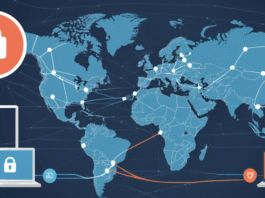
Introduction to Cyber Warfare in Africa
Recent research findings by Performanta, a multinational cybersecurity company headquartered in London, have brought to light a concerning trend: Africa is being utilized as a testing ground for cyber warfare by various nation-states. This revelation underscores the increasing cyber threats faced by developing countries, particularly within the African continent. As cyber warfare tactics become more sophisticated, Africa’s role as a testing ground has significant implications for its digital infrastructure and the broader geopolitical landscape.
Historically, cyber threats have predominantly targeted more developed nations with advanced technological infrastructure. However, the focus is shifting as cyber adversaries exploit the vulnerabilities present in developing countries. Africa, with its growing digital footprint yet often limited cybersecurity measures, has become an attractive target for these cyber warfare exercises. The continent’s diverse and expanding internet user base, combined with its emerging economies, make it a fertile ground for testing new cyber tactics and strategies.
The increasing prevalence of cyber attacks in Africa is not just a matter of regional concern but has global ramifications. Cyber warfare tactics tested in Africa can eventually be deployed on a larger scale, affecting critical infrastructure, economies, and national security worldwide. Moreover, the exploitation of Africa as a cyber warfare testing ground raises ethical questions about the responsibilities of nation-states in the digital age. It also highlights the urgent need for international cooperation and robust cybersecurity frameworks to protect vulnerable regions from becoming collateral damage in the cyber arms race.
This blog post aims to delve deeper into the implications of Africa’s role as a testing ground for cyber warfare. We will explore the dynamics of these cyber threats, the specific vulnerabilities being exploited, and the broader impact on both the continent and the global community. By understanding the current landscape and the strategies employed by nation-states, we can better prepare for and mitigate the risks associated with cyber warfare in developing regions.
Medusa Ransomware: A Case Study
Medusa ransomware has emerged as a significant threat in the cyber warfare landscape, particularly as highlighted in Performanta’s detailed analysis. Medusa operates as ransomware-as-a-service (RaaS), a model that enables cybercriminals to lease ransomware tools to affiliates in exchange for a share of the profits. This model’s proliferation underscores the evolving complexity and commercialization of cyber threats, making it crucial to understand the mechanics and strategies behind such operations.
Initially, Medusa ransomware targeted organizations within developing countries. The strategic selection of these targets can be attributed to several factors. Developing nations often have less robust cybersecurity infrastructures, making them more vulnerable to attack. Additionally, these regions may have fewer resources to allocate towards advanced threat detection and response mechanisms, creating a fertile testing ground for cybercriminals to refine their tactics without facing immediate, high-level retaliation.
As the attackers perfected their techniques and gained confidence in their methods, Medusa ransomware attacks expanded to include organizations in developed countries. This shift highlights a deliberate strategy: cybercriminals use less risky environments to test and optimize their ransomware before deploying it in more challenging and potentially lucrative settings. The implications of this pattern are profound for global cybersecurity, signaling that developing nations are not just victims but also proving grounds for cyber warfare tactics that will eventually threaten more secure regions.
The Medusa ransomware campaign demonstrates a clear pattern in the selection of target organizations. Attackers often prioritize entities with critical data and limited cybersecurity defenses, such as healthcare institutions, educational facilities, and small to medium-sized enterprises (SMEs). These organizations are more likely to pay ransoms quickly to regain access to essential data, fueling the continued viability of ransomware operations.
In essence, the Medusa ransomware case study provides valuable insights into the methodologies and strategic thinking of modern cyber attackers. By understanding the progression from targeting vulnerable entities in developing nations to more sophisticated attacks in developed countries, cybersecurity professionals can better anticipate and mitigate the risks associated with such threats. This knowledge is vital for constructing more resilient defenses and fostering international cooperation to combat the pervasive issue of ransomware attacks.
Africa as a Testing Field for Nation-State Cyber Attacks
Africa has increasingly become a focal point for cyber warfare, particularly among BRICS countries, which use the continent as a testing ground for their cyber attacks. Performanta’s recent findings highlight the sectors most frequently targeted in Africa, with finance, production, and energy sectors bearing the brunt of these malicious activities. The prevalence of financial and banking trojans in countries like Kenya and Nigeria underscores the intensity of these attacks.
In Kenya, the financial sector has seen a significant rise in sophisticated banking trojans designed to siphon off funds from unsuspecting users. Similarly, Nigeria has experienced an uptick in cyber attacks aimed at its banking institutions, with attackers deploying advanced malware to exploit system vulnerabilities. These attacks are not random but are part of a broader strategy by nation-states to test and refine their cyber warfare capabilities.
One of the reasons Africa is perceived as an attractive target for these cyber operations is the perception that African nation-states present less risk compared to Western countries. Nation-state attackers often believe that African countries have weaker cyber defenses and fewer resources to mitigate and respond to cyber threats. This perception influences their strategies, making Africa an ideal testing ground for new tactics, techniques, and procedures (TTPs).
The energy sector in Africa has also been a prime target, with cyber attackers focusing on critical infrastructure to disrupt operations and gather intelligence. The production sector, which includes manufacturing and industrial operations, has similarly faced an onslaught of cyber attacks aimed at disrupting supply chains and stealing intellectual property.
Overall, Africa’s role as a testing field for nation-state cyber attacks highlights the urgent need for enhanced cybersecurity measures across the continent. Strengthening cyber defenses and fostering international cooperation are crucial steps in mitigating the risks and protecting vital sectors from the growing threat of cyber warfare.
Building Collaborative Defense Strategies
In the rapidly evolving landscape of cyber threats, the importance of establishing robust, long-term collaborative defense strategies between Western countries and Africa cannot be overstated. As cyber warfare increasingly targets critical infrastructure and sensitive data, the need for cohesive, cross-border cooperation has become paramount. The potential benefits of such collaboration are numerous, ranging from shared intelligence to improved cybersecurity infrastructure and enhanced resilience against cyber attacks.
One of the primary advantages of collaboration is the sharing of intelligence. By pooling resources and information, Western countries and African nations can develop a more comprehensive understanding of cyber threats. This, in turn, allows for the identification of emerging threats and the development of proactive measures to counter them. Moreover, shared intelligence fosters a sense of mutual trust and paves the way for coordinated responses to cyber incidents, minimizing the impact of attacks.
Improved cybersecurity infrastructure is another significant benefit of collaboration. Western countries often possess advanced technological capabilities and expertise that can be leveraged to bolster Africa’s cybersecurity defenses. Through joint initiatives, such as training programs and technology transfers, African nations can enhance their ability to protect critical systems and data. Additionally, collaboration can facilitate the development of standardized cybersecurity protocols and best practices, ensuring a cohesive approach to threat mitigation across borders.
Enhanced resilience against cyber attacks is a further advantage of collaborative defense strategies. By working together, Western countries and African nations can build a unified front against cyber adversaries. This includes the establishment of joint response teams, the sharing of resources during crises, and the coordination of defensive measures. Such efforts not only strengthen individual nations’ defenses but also contribute to regional and global cybersecurity stability.
The roles of governments, private sectors, and international organizations are crucial in fostering collaborative efforts. Governments can enact policies and agreements that facilitate cooperation, while the private sector can provide technological innovation and expertise. International organizations can serve as neutral platforms for dialogue and coordination, ensuring that collaborative efforts are inclusive and equitable. By working in concert, these stakeholders can create a resilient and robust defense posture capable of addressing the multifaceted challenges of cyber warfare.



